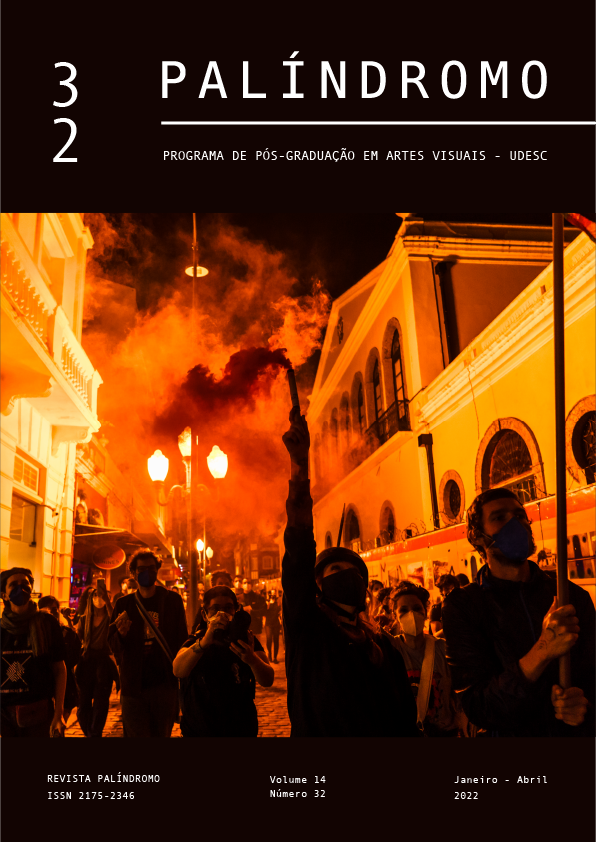Tecnologias da informação e comunicação na formação inicial do professor de arte: um estudo sobre currículo de artes visuais da UFMA
DOI:
https://doi.org/10.5965/2175234614322022185Palavras-chave:
Formação de Professores, Licenciatura em Arte, Tecnologia na educaçãoResumo
As tecnologias educacionais estão inseridas na matriz curricular de muitas Instituições de Ensino Superior, no intuito de preparar os discentes com um conhecimento básico sobre o tema. Este trabalho tem como objetivo principal observar a inserção das tecnologias no currículo do curso de licenciatura em Artes Visuais da Universidade Federal do Maranhão – UFMA, analisando, de forma comparativa, os Projetos Pedagógicos de 2010 e 2017. Os resultados obtidos nos indicam que as tecnologias são abordadas em algumas disciplinas como Arte e as novas tecnologias, dentre outras que visam atender a reestruturação do curso de Artes Visuais, e suprir a demanda de um público que é interativo e conectado. Para este estudo, optou-se pela pesquisa documental, estudo de caso e bibliográfica, fundamentando a discussão a partir das concepções de autores como Pimentel (2011), Cernev e Guerra (2017), Frizon (2015), Moran (2013), dentre outros. Assim, espera-se que as inquietações sobre a formação inicial dos professores de Arte levantados ao longo do trabalho contribuam para a reflexão da necessidade de aliar teoria e prática docente por meio da criação e ampliação de novos fazeres pedagógicas que potencializam o uso das tecnologias digitais em sala de aula.
Downloads
Referências
BARBOSA, Ana Mae. ARTE /EDUCAÇÃO: formando professores. In: PIMENTEL, Lucia Gouvêa. A prática artística docente como metodologia para a formação de professores. Revista CLEA, v. 1, p. 50-57 maio/jun. 2016.
BRASIL. MEC. CNE. Conselho Pleno. Parecer CNE/CES nº 22, de 07 de novembro de 2019. Diário Oficial da União, Brasília, 2019. Disponível em: http://portal.mec.gov.br/ index.php?option=com_docman&view=download&alias=133091-pcp022-19-
&category slug=dezembro-2019-pdf&Itemid=30192. Acesso em: 29 março 2020.
CERNEV, Francine K.; GUERRA, Renata R. TecnoArte: uso das tecnologias digitais num curso de formação continuada com professores de Artes. XXIII Congresso Nacional da Associação Brasileira de Educação Musical. Manaus, 16 a 20 de outubro
de 2017. Disponível em: http://abemeducacaomusical.com.br/conferencias/index.php/congresso2017/cn a/paper/viewFile/2597/1390. Acesso em 26 Nov. 2020.
COUTINHO, Rejane G. A Formação de Professores de Arte. In: BARBOSA, Ana Mae. (org). Inquietações e Mudanças no Ensino da Arte. 2ª Ed. São Paulo, Cortez: 2003.
EVANGELISTA, Caroline da Silva. O Ensino da Arte através do Computador: Uma Proposta de Prática Pedagógica para o Ensino Fundamental. V Colóquio Internacional: “Educação e Contemporaneidade”, São Cristovão- SE/Brasil, p. 1-16,
Setembro de 2011.
FRIZON, Vanessa; et.al. A formação de professores e as tecnologias digitais. Anais do XII Congresso Nacional de Educação - EDUCERE, 2015. Disponível em: https: https://educere.bruc.com.br/arquivo/pdf2015/22806_11114.pdf. Acesso em 02 Out. 2020.
LIMA, L.; LOUREIRO, R. C. Tecnodocência: concepções teóricas. Fortaleza: Edições UFC, 2019.
MARQUES, Elson Luiz Reyes; ORENGO, Gilberto; MÜLLER, Maykon Gonçalves; BUSS, Cristiano da Silva; SILVA, Marcos André Betemps Vaz da. Novas Diretrizes Curriculares Nacionais para a Formação Inicial de Professores para a Educação Básica: avanços ou retrocessos. Revista Educar Mais. 2021 | Volume 5 | Nº 3 | P. 637 - 649. DOI: https://doi.org/10.15536/reducarmais.5.2021.2409
MORAN, J. Tablets e ultrabooks na educação. IN: MORAN, J. Novas Tecnologias e Mediação Pedagógica. 21ª ed. Campinas, SP: Papirus, 2013.
PPC. Projeto Pedagógico do Curso de Licenciatura em Artes Visuais 2010. Ministério da Educação. Universidade Federal do Maranhão – UFMA. NDE, 2010. Disponível em: https://sigaa.ufma.br/sigaa/verProducao?idProducao=320361&key=048aa35aa0354adbb1a394467b6f578c. Acesso em: 20 Fev. 2021.
PPC. Projeto Pedagógico do Curso de Licenciatura em Artes Visuais 2017. Ministério da Educação. Universidade Federal do Maranhão – UFMA. NDE, 2017. Disponível em:https://sigaa.ufma.br/sigaa/verProducao?idProducao=320361&key=048aa35aa0354adbb1a394467b6f578c. Acesso em: 20 Fev. 2021.
PIMENTA S. G. Formação de professores: saberes e a identidade da docência. Revista Nuances Vol. III- setembro de 1997. Disponível em: https://revista.fct.unesp.br/index.php/Nuances/article/view/50/0. Acesso em: 20 Fev. 2021.
PIMENTEL, Lucia Gouvêa. Novas territorialidades e identidades culturais: o ensino de arte e as tecnologias contemporâneas. Anais da ANPAP, pp.765-771, 2011. Disponível em: http://www.anpap.org.br/anais/2011/pdf/ceav/lucia_gouvea_pimentel.pdf. Acesso em: 03 Jan. 2021.
PIMENTEL, Lucia Gouvêa. Ontens e hoje não fazem um amanhã: aprendizagens resistentes em artes visuais.26º encontro da associação nacional de pesquisadores em Artes Plasticas Memória e inventaÇÕES. Campinas, 25 a 29 de setembro de 2017.
Downloads
Publicado
Como Citar
Edição
Seção
Licença
Copyright (c) 2021 Herbia Araujo Soares, Luciana Silva Aguiar Mendes Barros

Este trabalho está licenciado sob uma licença Creative Commons Attribution 4.0 International License.
DECLARAÇÃO DE DIREITOS AUTORAIS
a. Os artigos publicados pela revista são de uso gratuito, destinados a aplicações acadêmicas e não comerciais. Todos os direitos autorais são atribuídos à revista. Os artigos cujos autores são identificados representam a expressão do ponto de vista de seus autores e não a posição oficial da Revista Palíndromo. O (s) autor (es) compromete-se sempre que publicar material referente ao artigo publicado no Palíndromo mencionar esta publicação da seguinte forma:
Este artigo foi publicado originalmente pela revista Palíndromo em seu volume (coloque o volume), número (coloque o número) no ano de (coloque o ano) e pode ser acessado em: http://www.revistas.udesc.br/index.php/palindromo
b. Plágio, em todas as suas formas, constitui um comportamento antiético de publicação e é inaceitável. A revista Palíndromo utiliza o software iThenticate de controle de similaridade


